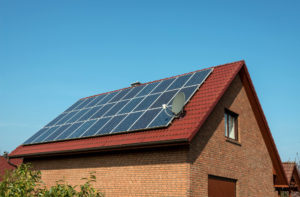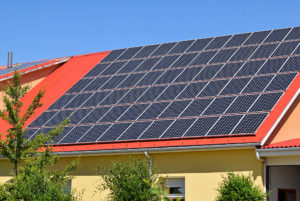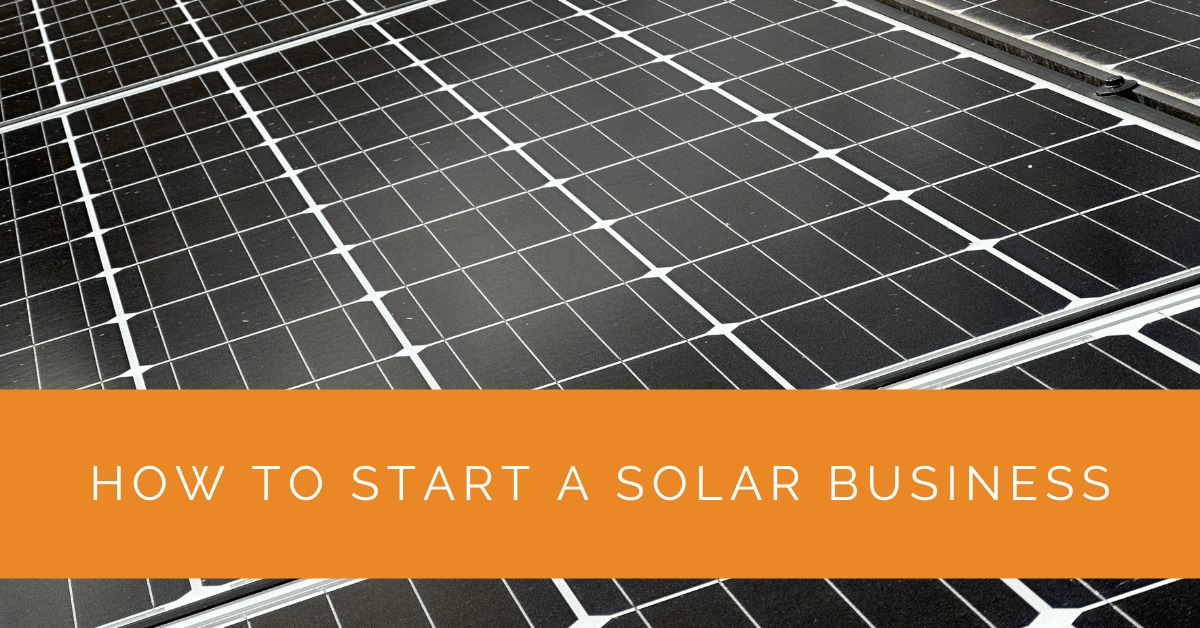In today’s rapidly expanding renewable energy market, starting a solar panel business presents a promising opportunity for aspiring entrepreneurs. This comprehensive guide will take you through the essential steps and strategies to establish and thrive in the solar industry. From understanding the solar energy market to developing a business plan, setting up your business, and marketing your services, we will provide valuable insights and practical tips to help you succeed.
Contents
Key Takeaways
- Understanding the solar industry and market trends is essential for positioning your solar business strategically and capitalizing on the growing demand for clean energy solutions.
- Proper planning, including a comprehensive business plan and setting up your business infrastructure, establishes a strong foundation for success in the solar industry.
- Implementing effective marketing and sales strategies, delivering exceptional customer service, and managing business expenses and finances are key factors for launching and growing a profitable solar business.
Understanding the Solar Industry
The solar industry is experiencing rapid growth and transformation as renewable energy sources gain prominence. Understanding the solar energy market dynamics is crucial for establishing a successful solar business. Let’s delve into the subheadings to gain a deeper understanding:
Exploring the Solar Energy Market
The solar energy market has witnessed significant growth due to increasing awareness of the environmental benefits and the shift towards clean energy. Various factors, including government incentives, declining costs of solar panels, and rising consumer interest in sustainable energy solutions, drive the demand for solar power. By exploring market trends, identifying target segments, and understanding consumer preferences, you can strategically position your solar business to meet the market’s evolving needs.
Solar Panel Installation: Key Components and Processes
Solar panel installations require a comprehensive understanding of the key components and installation processes. Solar panels, inverters, mounting systems, and electrical components all play a crucial role in the functioning of a solar system. Staying up-to-date with technological advancements and industry standards is important to ensure efficient and reliable installations. Understanding the installation process, including site assessment, design considerations, permitting, and interconnection, is vital for delivering high-quality installations that comply with local regulations and building codes.

Planning Your Solar Business
Proper planning is essential to lay a strong foundation for your solar business. This section focuses on the various aspects of planning your solar business to maximize success:
Developing a Business Plan
A well-crafted business plan acts as a roadmap for your solar business. It encompasses defining your business objectives, conducting thorough market research, and analyzing your competition. A comprehensive business plan should also include a detailed marketing and sales strategy, financial projections, and assessing potential risks and mitigation strategies. This strategic document will guide your initial setup and serve as a reference for future decision-making and growth.
Setting Up Your Solar Business
Setting up your solar business involves several key considerations to ensure a smooth operation:
- Choosing the Right Business Structure: Decide on the most suitable legal structure for your business, such as a sole proprietorship, partnership, limited liability company (LLC), or corporation. Each structure has different implications for taxation, liability, and management.
- Registering Your Company and Obtaining Licenses: Follow the legal procedures to register your business with the appropriate government authorities. Additionally, obtain the required licenses and permits to operate as a solar installation business in your jurisdiction. Compliance with local regulations is essential to establish credibility and ensure smooth operations.
- Establishing Your Office or Workspace: Determine the space requirements for your administrative and operational needs. Whether a dedicated office space or a home-based operation, ensure it is well-equipped and provides a professional environment to conduct business activities efficiently.
- Procuring Essential Equipment and Tools: Acquire the equipment and tools required for solar panel installations. This may include solar panels, inverters, mounting systems, electrical components, testing equipment, and safety gear. Establish relationships with trusted suppliers to ensure the availability of high-quality products.
Business Insurance and Legal Considerations
Protecting your solar business and managing potential risks is crucial. Obtaining adequate business insurance is essential to safeguard your assets, employees, and customers. Liability, workers’ compensation, and general business insurance are among the key coverage types to consider. Additionally, familiarize yourself with legal considerations, such as contracts and warranties, to ensure clear and transparent dealings with customers and suppliers. Consult with legal professionals experienced in the solar industry to ensure compliance with relevant laws and regulations.

Launching and Growing Your Solar Panel Business
Once you have laid the groundwork, it’s time to launch and grow your solar business. This section covers strategies for establishing a strong presence in the market and expanding your operations:
Building a Professional Network
Networking is crucial for building a successful solar business. Establishing a professional network can foster valuable relationships within the solar industry. Here are some key aspects to consider:
- Collaborating with Suppliers, Manufacturers, and Distributors: Build strong partnerships with trusted suppliers, manufacturers, and distributors of solar equipment and components. Having reliable and quality products is essential for delivering top-notch solar installations.
- Connecting with Industry Professionals: Attend industry conferences, trade shows, and networking events to connect with professionals in the solar industry. Engage in discussions, share experiences, and learn from other’s expertise. Networking can lead to collaborations, referrals, and growth opportunities.
- Joining Associations and Industry Groups: Become a member of industry associations and organizations dedicated to renewable energy and solar power. These groups offer resources, training, and networking opportunities for the solar industry. Active participation can enhance your industry knowledge and visibility.
Marketing and Sales Strategies
Effective marketing and sales strategies are vital for attracting customers and establishing a strong market presence. Consider the following:
- Building a Strong Brand Identity: Develop a compelling brand that reflects your values, expertise, and commitment to solar energy. Design a visually appealing logo, create a memorable tagline, and ensure consistent branding across all marketing materials.
- Creating a Professional Website and Online Presence: Invest in a well-designed website that showcases your services, portfolio, and customer testimonials. Optimize it for search engines to improve visibility. Leverage social media platforms and online directories to reach a wider audience.
- Implementing Digital Marketing Strategies: Utilize digital marketing techniques such as search engine optimization (SEO), pay-per-click advertising (PPC), and content marketing to increase your online visibility. Share informative content, engage with your audience, and establish your authority in the solar industry.
- Building a Referral Network and Utilizing Customer Testimonials: Encourage satisfied customers to refer your services to their friends, family, and colleagues. Word-of-mouth marketing can be a powerful tool. Request and showcase positive customer testimonials on your website and other marketing channels to build trust and credibility.
Delivering Exceptional Customer Service
Providing exceptional customer service is paramount for long-term success and client satisfaction. Consider the following:
- Clear Communication and Transparency: Maintain open and transparent communication with clients throughout the solar installation. Address their queries promptly, provide regular project updates, and ensure they are informed about the progress and expected outcomes.
- Accurate Quotes and Proposals: Provide detailed and accurate quotes and proposals that clearly outline the scope of work, associated costs, and project timelines. Transparency in pricing and deliverables helps build trust with customers.
- Post-installation Support and Maintenance Services: Offer post-installation support and maintenance services to address any issues or concerns arising after the solar panel installation. Timely response to service requests and providing ongoing maintenance plans can enhance customer satisfaction and loyalty.

Managing Business Expenses and Finances
Effectively managing your business expenses and finances is crucial for sustainability and profitability. Here are key considerations:
Estimating Startup Costs
Thoroughly assess the initial expenses associated with starting a solar business. Consider costs such as equipment and tool purchases, inventory, marketing and advertising, office space, utilities, and employee salaries or contractor fees. Prepare a detailed budget and factor in contingencies to ensure you have adequate funds for a smooth startup.
Financial Management and Funding
Establish robust financial management practices to track cash flow, monitor expenses, and maintain financial records. Consider utilizing accounting software to streamline financial processes. Explore funding options, such as small business loans, grants, or partnerships with investors, to secure capital for your solar business—additionally, research government incentives and support programs to promote renewable energy businesses.
Expert Insights From Our Solar Panel Installers About How to Start a Solar Business
Starting a solar business requires a deep understanding of the market and the technology. From my experience, staying updated with industry trends and technological advancements is crucial for delivering high-quality installations.
Senior Solar Installer
Building a professional network is key. Strong relationships with suppliers and industry professionals can significantly impact the quality of your installations and your business’s growth.
Lead Solar Technician
Effective financial management is essential for a successful solar business. Properly estimating startup costs and managing expenses can ensure sustainability and profitability in the long run.
Chief Solar Engineer
Conclusion
Understanding the solar industry, planning your business effectively, launching and growing your operations, and managing business expenses and finances are critical for establishing and scaling a successful solar business. By deeply understanding the solar energy market, including trends and target segments, you can position your business strategically to meet evolving demands. Thorough planning, encompassing a well-crafted business plan, setting up your business infrastructure, and ensuring proper insurance coverage and legal compliance, sets a strong foundation for success.
Once launched, growing your solar business requires effective marketing and sales strategies to attract customers and establish a strong market presence. Building a professional network through collaborations, industry connections, and association memberships can open doors to partnerships and referrals. Leveraging digital marketing techniques, such as a professional website, online visibility, and engaging content, can expand your reach and enhance your brand identity. Exceptional customer service, characterized by clear communication, accurate proposals, and post-installation support, cultivates long-term client satisfaction and positive word-of-mouth.
Managing business expenses and finances is crucial for the sustainability and profitability of your solar business. Estimating startup costs accurately, considering equipment, marketing, office space, and employee expenses, ensure you have adequate resources. Implementing robust financial management practices and utilizing accounting software enables you to track cash flow, monitor expenses, and maintain accurate records. Exploring funding options, such as small business loans or government incentives, can provide the necessary capital for business growth and expansion.
By excelling in understanding the solar industry, planning your solar business effectively, launching and growing your operations, and managing business expenses and finances, you lay a solid groundwork for building a thriving and profitable solar business. Embrace the opportunities in the renewable energy sector, and leverage your expertise to contribute to a sustainable future while achieving business success.
About the Author
Solar Panels Network USA stands at the forefront of solar energy solutions, driven by a team of seasoned solar engineers and energy consultants. With over decades of experience in delivering high-quality solar installations and maintenance, we are committed to promoting sustainable energy through customer-centric, tailored solutions. Our articles reflect this commitment, crafted collaboratively by experts to provide accurate, up-to-date insights into solar technology, ensuring our readers are well-informed and empowered in their solar energy decisions.

